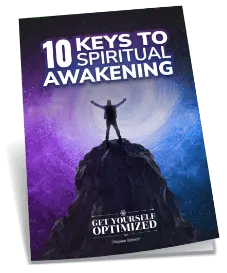This article was originally published on Huff Post.
You’re talking to yourself again. Yes, you are and you don’t even realize it. Don’t worry, it’s not out loud, so no one else can hear you. And it doesn’t mean you’re crazy; we all do it. We usually say the same things over and over, like a tape on continuous loop. One of the things in that continuous loop is a question — your “primary question.” It’s the question you unwittingly ask yourself over and over, and it colors all of your experiences. It influences everything you do, how you act and react to situations, and what you expect to get out of life. And it is unique to you; each individual has their own primary question, based on their own upbringing and background. This question, the one you don’t even know you are asking, is very powerful and might be the key to your success — or be the very thing that is holding you back.

Tony Robbins puts it thus: “What’s the primary difference between people who are successful and those who aren’t? Quite simply, successful people are those who have asked better questions and, as a result, gotten better answers.” At first blush, this seems a little glib, perhaps even overly simplistic. Surely luck and circumstances play a far larger role in someone’s success than the questions they ask themselves? But upon further investigation, you begin to see the truth in this statement. Take, for example, someone whose primary question is “Why do I always fail?” This question might refer to business or personal relationships, but it is full of presuppositions about that person’s own ability to succeed. It already assumes a measure of failure. And our brain always seeks to give answers to the questions we ask of it. When our questions are full of such limiting beliefs, it’s like leading the witness in a trial — our brain will tell us what we already expect to hear.
The biggest problem with our primary question is that we often don’t know we are asking it and so we can’t see how we are undermining ourselves. It’s invisible to us, but it determines what we focus on, what we notice in our lives. The goal is to identify our primary question, to expose it so we can begin to render it powerless if it is holding us back in life. But discovering our primary question is no small feat. Because it is so deeply embedded into our unconscious, it can take months of personal reflection to root it out. I’ve been to multiple Date With Destiny events where we focused on finding our primary question, and it always seemed to elude me; I just couldn’t quite seem to reach that part of myself. It wasn’t until my third such event that all the pieces fell into place. When they did, I was struck by just how much damage the negativity of my primary question had caused in my life. And to show you just how much power our primary questions have, I want to share my deeply personal story with you.
How can I avoid being alone? This is the question that heretofore has driven much of my life, up until a few short months ago. If you understand my childhood, you can begin to see why. I spent much of my youth bouncing around between relatives, from my grandparents to my aunt, back to my grandfather (my grandmother had died at this point), to my mother, back to my grandfather and finally on to foster home. Without a stable home life and consistent caregiving, I often felt lonely as a child and it had repercussions in my adult life. It is why I got married at 19, why I had kids right out of the gate, and why I’ve always traveled so much — I never wanted to be alone, sitting at home by myself.
Once you discover your own unique primary question, Robbins’ words begin to make more sense and to have a real application in your own life. As he says, “The quality of our life depends on the quality of the questions we ask ourselves.” If we ask ourselves negative, hurtful questions, we find negative answers, we see the world through a negative lens and we act and react in a negative fashion. Our questions determine our focus, and thus our experiences.

It doesn’t stop with simply identifying your primary question, of course. Now the real work begins, the work of changing your primary question into something more positive, less hurtful and more solution-focused. Once again, easier said than done. The first step is to scramble the thinking patterns that led to the original primary question in the first place. Because we have now identified our primary question, we can catch ourselves in the act when that old, familiar tape begins to play in our heads, and try to shift the focus. This isn’t instantaneous, it takes time and practice, but eventually this shift becomes second nature.
How do we even know what our new primary question, our new focus, should be? Finding the “perfect” new primary question isn’t really the point; it isn’t the end goal in itself. It is the process of learning to ask empowering questions in the moments that we need them most, particularly in times of stress or crisis, that is the critical takeaway here. Take, for example, the question “How can I make this better?” This is an empowering question indeed; it is actionable and it is solution-focused. It assumes that things can be better, in every situation. In my case, I chose a new primary question that could help me connect with the world in a deeper, more positive capacity. How can I share the abundance of love that is in my heart right now? This presupposes that I have all the love I need, that my heart is full, that I do not lack for love and I need not crave it from external sources.
Although our own new primary question might not be quite so all-encompassing, we owe it to ourselves to aim high. If the quality of our questions determines the quality of our life, it is within our own power to change our circumstances. If you’re expecting someone else to do it for you, you might as well be waiting for Godot.







